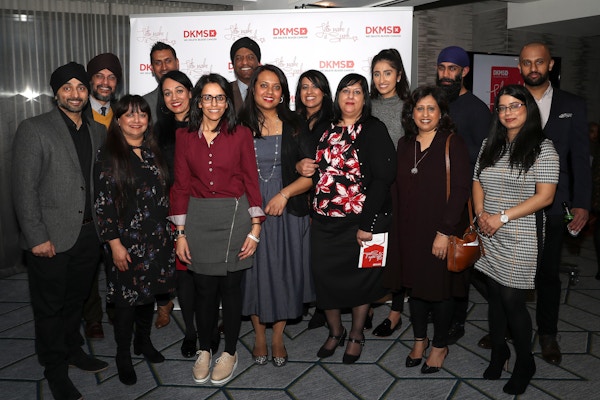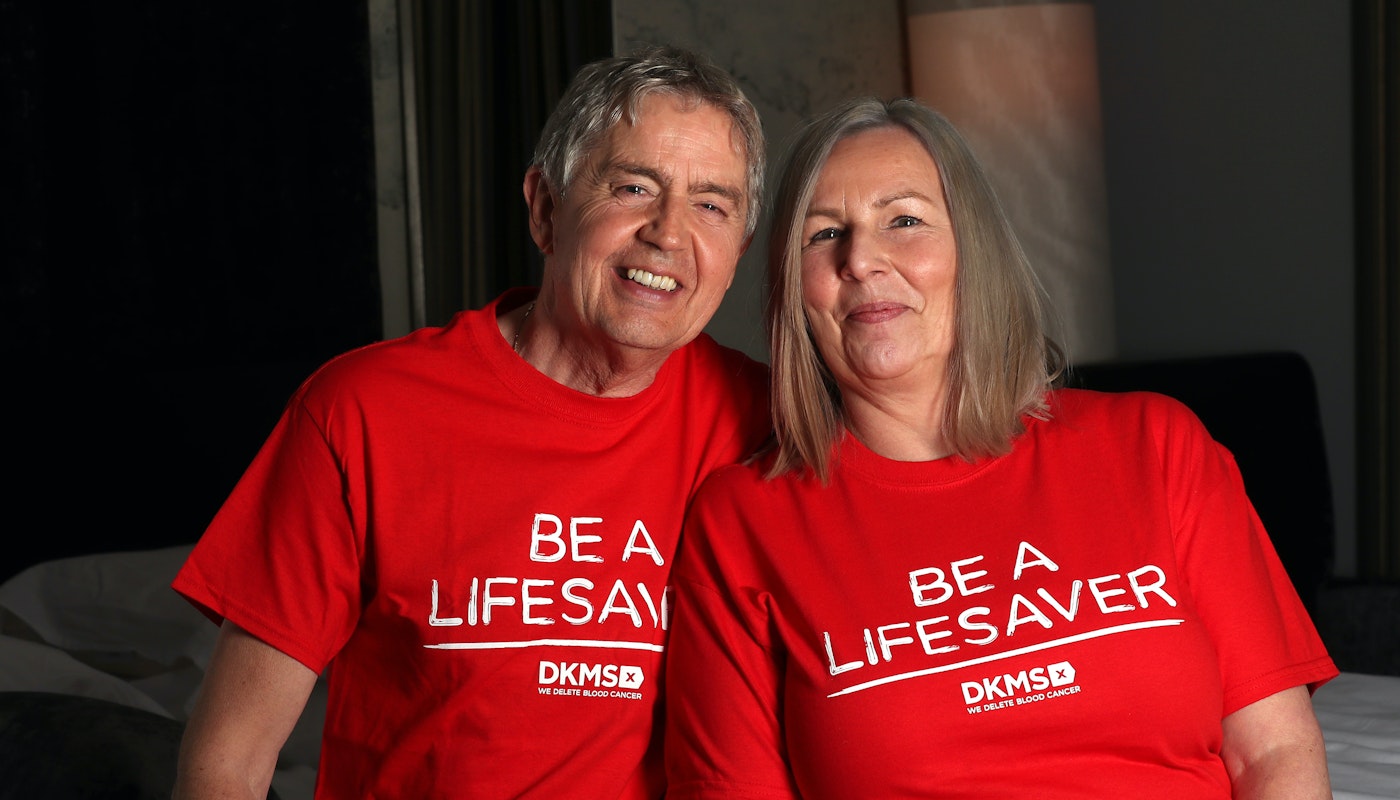In the aftermath of losing her battle, Dr Harf made it his mission to raise awareness of blood cancer and of the fact that becoming a donor is a startlingly simple process, involving simply swabbing your cheek and sending that swab back to DKMS. In just one year, the number of stem cell donors registered in Germany rose to 68,000. Almost 30 years later, the charity has expanded into other countries, including the UK, and is only slightly shy of hitting 10 million registered donors – and thus 10 million potential matches for blood cancer patients. And yet, the fight is still in its infancy; despite the large numbers, only two per cent of the UK population is currently registered. DKMS’ aim is to delete the disease and in that effort, has made it its mission to drive the change.
We caught up with Gabriella Brooks in DKMS’s marketing department. Here, she shares the charity’s aims, triumphs and hopes for the year, as well as explaining how you can become a donor.
Can you give us a broad overview of the work that DKMS does?
DKMS is a global not-for-profit organisation dedicated to the fight against blood cancer through recruiting stem cell donors and providing second chances at life; creating awareness of blood disorders and raising funds to match donor registration costs.

The charity has grown exponentially since it began in 1991, but it started with founder Dr Peter Harf’s very personal and moving story. Can you tell us a little about how it all came about?
The DKMS journey began in 1991, when our founder, Dr Peter Harf, established the charity in honour of his wife, Mechtild. Sadly, Mechtild had lost her battle with blood cancer in 1991, following the family’s unsuccessful search to find a potentially lifesaving matching blood stem cell donor. At that time, there were only 3,000 potential blood stem cell donors available to provide a transplant in Germany. Today, we register on average 3,300 new donors a day. Peter had a vision to change this and create a future where every blood cancer patient has a second chance of life.
Within one year of the founding of DKMS, the number of registered potential blood stem cell donors had increased nearly 23 times, to 68,000 people. This gave even more inspiration to Peter and reinforced his motivation to ‘delete blood cancer’.
Can you give any insight to how he achieved such mind-blowing success?
Even after Mechtild passed away, Peter and a small team of very committed supporters were determined to continue their fight against blood cancer.
Throughout the following year, they organised a number of very successful donor drives recruiting thousands in one single day. They were able to register over 8,000 donors at a drive in Hamburg in May, two days before DKMS was founded. At another donor drive in Dresden in September, they recruited over 5,000 new potential lifesavers. These figures may seem quite conservative to us these days but all this happened in a world without social media.

In addition to these successful donor drives, Peter was instrumental in getting the subject of blood cancer and the lack of donors into the German media and many influential and highly watched TV programmes did features on the subject. This all helped to raise people’s awareness of the fact that people could help patients with blood cancer by simply swabbing and becoming a potential lifesaver.
Can you tell us a little bit about blood cancer itself – how prevalent is it? Who does it affect, and what is a typical prognosis (if such a thing exists)?
Blood cancers are now the third most common cause of cancer death in the UK. Every year, over 30,000 people are diagnosed with blood cancer in the UK.
Blood cancer is an umbrella term for cancers that affect the blood, bone marrow and lymphatic system. Most of these cancers start in the bone marrow, where blood is produced. Stem cells in the bone marrow mature and develop into three types of blood cells: red blood cells, white blood cells or platelets. In most blood cancers, the normal blood cell development process is interrupted by uncontrolled growth of an abnormal type of blood cell. These abnormal blood cells, or cancerous cells, prevent the blood from performing many of its functions, such as fighting off infections or preventing serious bleeding.

There are three main groups of blood cancer: leukaemia, lymphoma and myeloma. While for most people there is no single cure, a blood stem cell donation from a genetically similar person can offer the best treatment and could help give someone in need of a transplant a second chance at life.
It can be tricky to spot the warning signs of blood cancer. This is mainly because not all signs of blood cancer can be easily identified, or are associated with typical symptoms of cancer, such as an unknown lump or abnormal mole. Blood cancer often presents in ways which are most commonly associated with unrelated and less serious illnesses, like a cold or flu. In other circumstances, patients notice a change in their body which they can’t quite put their finger on.
Dr Harf’s mission is to ‘delete blood cancer’. You seem to be making amazing headway with that aim, with some 9 million donors now on your register. Do you think that Dr Harf’s ultimate aim will be met in the foreseeable future? And what would it take for it to be met?
We can only hope that one day blood cancer will be deleted through scientific research and new drugs. In the meantime, we need to recruit as many people as possible to sign up to the blood stem cell register to become donors.
We are, this year, very close to recruiting our 10th millionth donor. This means that patients in need have a higher likelihood of not only finding the perfect match they need, but also a higher chance of a successful transplant.

Reaching 10 million registered donors is an incredible accomplishment and one that our staff, volunteers and of course our donors, will be proud to celebrate. However, we do not measure success by the number of donors registered, but by the number of lives we are to save.
DKMS now has outposts around the world, having opened in the UK, India, Chile, Poland, the US and, of course Germany. Do you have any more plans for expansion?
Our mission is to delete blood cancer so we are always looking at where to establish another organisation, and to continue to offer more people a second chance at life.
What are the main challenges that the charity faces?
We are relatively new on the UK’s charity landscape so one of our main challenges is to get our name out there and be recognised for the work we do. We are the only blood cancer charity in the UK who recruit blood stem cell donors up to the age of 55.
Obviously, we still have a lot to do but our main driver is to recruit as many donors as possible so people with blood cancer have their match waiting for them rather than them having them seeking them out during a time of illness and uncertainty.
Over the next two years, we aim to increase awareness of the work of DKMS and the vital role of stem cell donations in helping people to survive.
How can our readers become donors?
To be on the register, you just have to register online, swab your cheek with the screening kit you get sent, then that’s it. The donation process itself is also a lot simpler than people think – with 90 per cent of donations done by collecting blood not through bone marrow extraction. The stem cells are harvested and the blood returned to the patient – with the stem cells regenerating in less than two weeks.
If you’re aged between 17 and 55 and in general good health, please go to DKMS.org.uk and request a swab kit. You simply swab the inside of your cheeks and send everything back to DKMS. Your details will be added to the registry and you will then by on standby as a potential lifesaver.

What are your main routes to fundraising?
Fundraising is all about giving people opportunities to feel good about themselves whilst doing something good for others. At DKMS we have a fun and varied events calendar throughout the year that really puts our supporters at the heart of what we do. Our amazing supporters undertake some incredible challenges, everything from gaming to skydiving. We have runners every year in the London marathon, Great North Run and other sporting events. Recently, a young supporter and former patient asked his family and friends to donate money to DKMS instead of receiving birthday presents. He raised £10,533 which helps with the costs of recruiting even more potential life savers.
We work closely with companies to hold registration events and to forge mutually beneficial corporate partnerships creating exciting and innovative projects that make a tangible difference to our lifesaving work. We also hold an annual gala in London which raises over £1 million.
In the charity’s 27-year history, what have been the standout moments?
There are too many to mention but last year in the UK, we broke all previous records for the requests for swab kits in just one day. In November, we joined up with comedian Al Murray. Very sadly, Al’s six year old nephew, Finley was diagnosed with juvenile myelomonocytic leukaemia in May. He was receiving blood transfusions and chemotherapy. However, doctors have said that he will eventually need a blood stem cell transplant.
Al wanted to work with us to encourage more people to come forward to join the to Blood Stem Cell Register, not only for his nephew, but for others too. He made a number of TV appearances throughout the day and gave many radio and newspaper interviews – we received over 30,000 requests for swab kits in just one day!!
What are your biggest hope for 2020?
To recruit as many blood stem cell donors as possible over the coming twelve months. At the moment, a woefully low two per cent of the UK population are on the register and we want to dramatically increase this figure. We want every person with blood cancer to have their match waiting for them so they can have a second chance at life.
To find out more and to request a swab kit, visit www.dkms.org.uk.
READ MORE
MacIntyre
Six Beauty Brands That Are Giving Back
10 Sites to Donate to Australia’s Bush Fire Relief
By Nancy Alsop
February 2020


